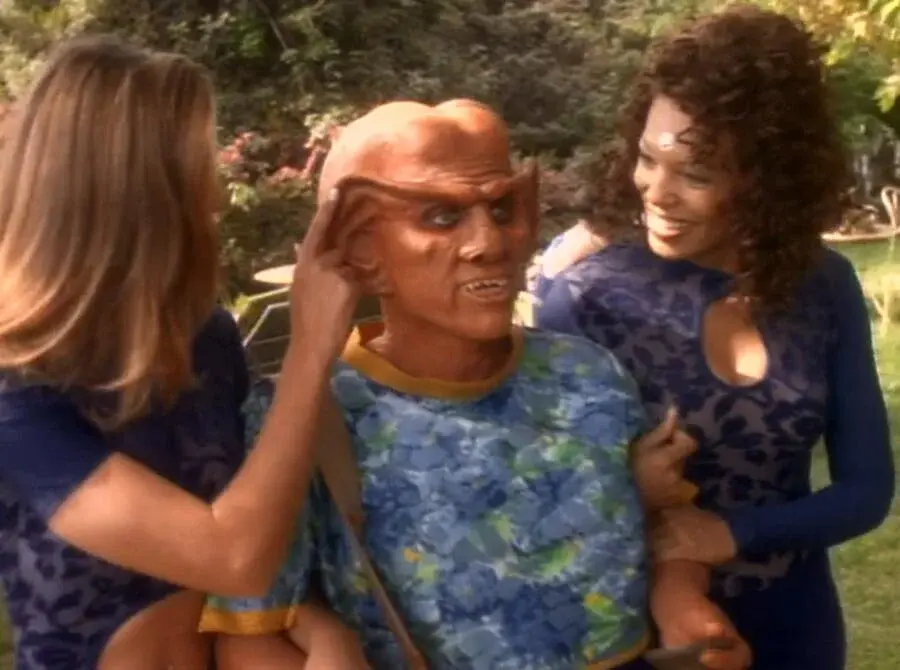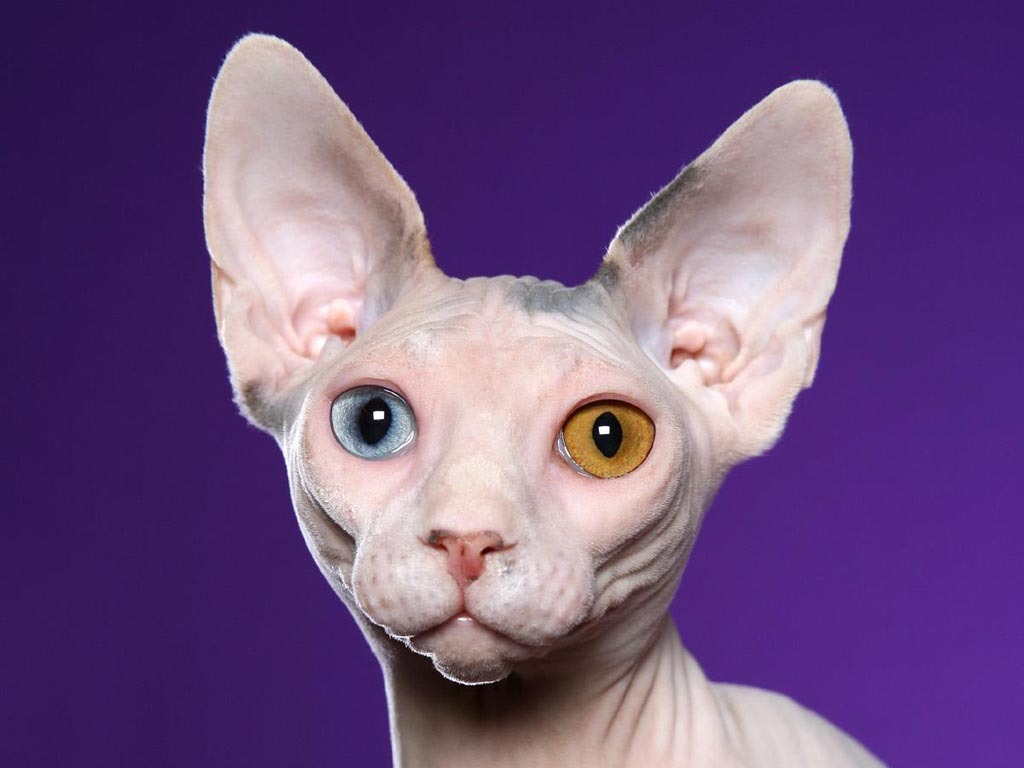Let’s be real.
Rowling started out making a fairly bog standard magical kids book. It was all about the fantasy of being a wizard, and relied on tropes so old they get found in La Brea.
This isn’t a bad thing. There’s nothing wrong with that kind of kid lit.
But she wasn’t a good writer. She was mid tier at best. So the eventual success of the series got beyond her abilities. While the last book was much better overall than the first few, it still relied on shoddy world building because she had chased sales.
She tried to turn a kid’s light fantasy into a YA fatasy-adventure. To an extent, it worked. And I don’t mean that it wasn’t successful, she had a hit on her hands because the idea behind it all was brilliant. It pulled from a long history of British youth fiction, and added in fantasy and magic and a ton of tropes.
But from the perspective of a coherent story in a coherent world, ignoring the success in terms of sales, it was cobbled together without a plan, and it shows. It wasn’t until maybe order of the phoenix that she had a plan for how the story would end, and she had to do a lot of hand waving to make it happen.
Again, that’s okay. Nothing wrong with a bit of light fiction. But, it had cultural impact way beyond its original scope. So it draws the same kind of analysis that something like LOTR does, and it just can’t compare. It barely holds up to comparisons with Narnia, and Narnia at least kept things vague and mystical without trying to get into the mechanisms under the hood.
For whatever reasons, Harry, in the books, long before the movies, resonated with kids. So the series exploded. And now everyone pokes at it like it was ever supposed to be literature, with any serious thought behind it. It was all broad brush strokes on construction paper from the beginning, expecting anything in it to hold up to scrutiny is like expecting politicians to be honest and up front. It is what it is.
And now everyone pokes at it like it was ever supposed to be literature, with any serious thought behind it.
terf lady doesn’t help herself by incessantly insisting that everything was planned from the very start
Let’s be real here, she started off just writing a fun story, think nothing of it, and it became a cult. There’s two ways to go about this; 1) milk it for everything it’s worth, or 2) let the fans go apeshit on fanfic without providing anything more. She chose option 1. Cause money.
Arguably I think all the flaws combined with its popularity is why there are so many HP fanfics out there and they are at least part of the popularity of the work.
It’s like confidently posting a wrong answer on the Internet, people can’t help but want to correct you. Same with her story, which fuels a good chunk of the dialogue and discussions about it.
If it was bad or unpopular no one would care. If it was extremely well written, with little to no plot holes, people would like it, but that’s kind of it. Harry Potter just seems to have the right mix of good ideas and poor execution while remaining popular enough to be relevant to generate seemingly endless efforts to fix or improve it.
I always say - to defend the series (which doesn’t need too much defending, it’s the most successful book series after the old testament > new testament > Quran trilogy). The magic of Harry Potter is that all of the fantasy magic works exactly as well as it needs to right at the moment that it’s directly in front of the readers eyes. As you mention, as soon as it leaves the view of the characters in the story, it literally blows up into nonsense. However, as the story is being told the magic used is awesome and just what the plot needs at that exact moment to move along.
To be fair, Harry Potter is probably more logically consistent than the Bible is.
That’s like saying that an arthritic dog probably walks faster than one without legs.
as the story is being told the magic used is awesome and just what the plot needs at that exact moment to move along
That’s bad writing.
https://en.wikipedia.org/wiki/Deus_ex_machina
a plot device whereby a seemingly unsolvable problem in a story is suddenly or abruptly resolved by an unexpected and unlikely occurrence
That’s bad writing.
Eddie Valiant: You mean you could’ve taken your hand out of that [hand]cuff at any time?
Roger Rabbit: No, not at any time! Only when it was funny!
Kind of a terrible example. WFRR has good world building that holds up. Roger is a toon, and therefore must obey Toon Law. He literally, physically, could not remove the cuffs unless it would be (objectively) funny to do so. Eddie being humorless us why he’s an effective foil and investigator; the toons have trouble working him because he doesn’t find them funny.
Toons also aren’t supposed to be able to kill or die, which is why they need a detective in the first place: the world has well-defined rules which have apparently been violated.
The HP world has flimsy rules that depend on the character and the story. The rules of magic are only enforced until an exception is needed, when one is justified to let a character do what the plot demands.
Great point about Toon Law. I guess the HP is more about the Plot Demands This tropes. tbh I don’t know HP that well, I found the movies to be kind of boring and I never got past a couple chapters of the first book.
As the person before me mentioned, scrutinizing the magic expecting it to be high literature is self-defeating. I never said I would defend the story on the merits of its writing, it’s a book series written for young adults.
Deus ex machina is egregious when a story that has otherwise been consistent pulls the rug out from under you with a twist that makes no sense. The magic in Harry Potter is consistently inconsistent, as I mentioned it only makes sense when it’s directly in front of the readers eyes. It doesn’t just show up as deus ex machina that saves the characters life at the end of the book and leaves the reader feeling betrayed, the reader expects magic to save the day because since page 1 magic has been doing whatever has been conveniently cool to move the plot along in the main character’s favor.
It’s not less egregious because they do it in every chapter. It’s just a bad story. No one is attacking you or your favorite books; but the fact is they’re not that good.
You said you wanted to “defend the series” (the books). With books, what else is there to defend except the writing? As other people have mentioned, there are good consistent stories for children and fantasy authors who know what consistency means. It won’t affect your life in any way to admit that JK Rowling is not good at writing.
“But she always does this.” Lol.
As I mentioned before, I don’t really have to work too hard to defend one of the most sold non-religious books of all time.
I suppose, yes, pedantically there’s nothing in a book but writing. But that’s an issue of semantics, in my view writing can be bad and there’s still things like characterization, plot, world building, and character conflict, writing is how you put it together. I can see that that can all be classified as writing, but again, semantics, often people separate writing from those aspects, often they don’t. If the word writing bothers you, please, when you read it replace it with the word you think I mean I don’t mind.
As I said in the post you responded to, I don’t defend her writing, nor did I say it was my favorite book, makes sense that you have to strawman me to try and attack me.
Michael Bay movies aren’t fun to watch because they have airtight plots and intelligent writing. They’re fun to watch because there are sparkly things going boom and it looks pretty.
The Harry Potter series is effectively the same thing. A spectacular story that’s fun to experience the first time through.
In both cases, if you think too hard about it, the thin veneer giving the appearance of coherence disappears and you’re left with a logically inconsistent mess.
It’s not going to stop me from watching Independence Day or reading Prisoner of Azkaban again though.
“But from the perspective of a coherent story in a coherent world, ignoring the success in terms of sales, it was cobbled together without a plan, and it shows. It wasn’t until maybe order of the phoenix that she had a plan for how the story would end, and she had to do a lot of hand waving to make it happen.”
“But she wasn’t a good writer. She was mid tier at best. So the eventual success of the series got beyond her abilities. While the last book was much better overall than the first few, it still relied on shoddy world building”
Excellent explanation. The first HP book is excellent. It really sucks you in. After book 4, the quality declines and they become slogs to get through.
To say it more bluntly: That whole story ark was cobbled together by an amateur and is barely hobbling on crumbling crutches. In regards of storytelling and consistency it’s one of the most shitty dilettantic book series I’ve ever encountered. And the characters aren’t coming alive, they are just bland and boring.
Really bad books.
She’s a billionaire.
We have a saying in Germany: Eat shit - millions of flys can’t be wrong.
It’s not meant to be a well sewn up world building project. It’s literally two different worlds smashed together on a bunch of napkin notes. None of us read it for its intricate political maneuvering or realistic magic system.
And that’s why I bailed around book 5. Around that point I decided I wanted more realism, so I switched to Tom Clancy and JRR Tolkien, and I have been reading more “realistic” fiction ever since.
You brought up a really good example of a fantasy world with boundaries by mentionning Tolkien. It is heavily insinuated in the LOTR books that “magic” is not “endless posibilities magic”, it has more to do with special aptitudes and/or knowledge depending on the race (like elves or wizards). It’s not like Gandalf can just snap a finger and transform someone into a chicken. I know it limits what you can do with your world but in the case of HP it opens the door to endless plot holes and contradictions.
It goes along with Sanderson’s Laws of Magic, specifically rule 1:
An author’s ability to solve conflict with magic is DIRECTLY PROPORTIONAL to how well the reader understands said magic.
It works for HP because it’s targeting kids, but adults get frustrated because Rowling just makes up stuff each book. For example, why are port keys not a thing before book 4? (it would be a lot easier to take a portkey to Hogwarts than a train) Because they’re a plot device at the end of book 4, and almost never used again.
Rowling uses magic way too much to solve problems in HP and she does so inconsistently, but that’s totally fine because the point of the story is to appeal to kids and inspire imagination (and kids love quick solutions to problems), not to appeal to adults.
Really interesting concept you brought up, did not know that law and yes it makes perfect sense.
And I totally get your point, but it is still an issue to me considering that she wanted to keep the audience hooked as they aged. As someone put it in another comment, in the first book, Harry is eleven, it appeals to kids ~11 y.o, and so on. But, and I speak personnaly, by the fifth book it was already too disjointed for 15 y.o. me. Her books are like a Jojo’s Bizarre Adventure book/episode, but without all the corny humor and the self-awarness that makes it fun.
Idk, my oldest kid is 10 and has finished the whole series. She may have intended kids to grow with the series, and that was certainly true when they came out (I remember my cousin reading the books as they came out), but I do think they have limited appeal to more mature audiences.
That said, I do still read YA novels, and I’m definitely not the audience, so I’m sure there are plenty of older kids and adults who aren’t as bothered by plot holes and whatnot.
If you like realism in a fantasy setting, Delicious in Dungeon absolutely delivers. They take world building to a whole new level of detail.
It’s a bit light on the high level stuff like global politics and history. But for an example of the level of detail they went for (keeping it vague to avoid spoiling anything), one problem they solve involves a character knowing how dragons are able to breathe fire. Even though they have magic in this world, they still came up with a plausible physical mechanism for how dragons breathe fire and wove it into the plot.
At another point, a character gives advice about best practices if you’re about to turn into stone.
The only thing I don’t like about Delicious in Dungeon is that there’s not enough cooking. Maybe Senshi could teach us about preserving food in various ways - pickling, brining, salting, smoking, maybe even canning - in future episodes.
Even better if it happens accidentally due to some monster just being a monster around some food they initially think is ruined but then realize was just changed.
Yeah! Maybe there’s a monster plant that makes vinegar and it gets on some onions and cucumbers
I’ll have to check it out, thanks!
I do appreciate realism, but I think I care more that magic (or technology) use is proportional to its impact on the plot. For example, I love hard-scifi stories, but only where the details truly matter for the plot (e.g. The Moon is a Harsh Mistress) and not as much where it distracts from the plot. I also don’t mind totally unrealistic settings, provided the magic/tech isn’t needed to drive the plot (e.g. The Wheel of Time 1&2 is more concerned with character development than how the magic actually works).
It’s hard to gauge where this one would fall in that regard tbh. The plot is written around the level of detail and kinda even feels secondary, like it’s just there to give them a goal to work towards while the show itself is about a party navigating their decision to just cook and eat monsters they defeat in the dungeon instead of buying rations.
First of all, it’s a kids book.
Second of all, it’s a poorly written kids book.
Eh, I think it’s pretty well-written. It hits all the important parts of a good kids novel series:
- fun to read
- few immediately obvious plot holes (that a 10yo would notice)
- easy for a child to imagine that they’re in that world
We need more series like Harry Potter with high engagement that also promote creativity.
Plot holes? In Harry Potter? Why I never!
JK Rowling was shit. Lmao
is
The SuperCarlinBrothers made a convincing case that Felix Felicias is just a placebo on steroids.
I think nothing beat the fact Slytherin still exist after the founder basically came out as a racist and want racist rule to be enacted, and also only accept student that’s either a racist or speak parseltongue, and also the student literally live in a dungeon that’s dark and gloomy. You’d think after a few years Salazar left the other founders will take note and change the way the house pick their student and the living condition of the student quarters, but nope.
And you’d think this is a story about the danger of tolerating the intolerant, then the writer became the intolerant lol.
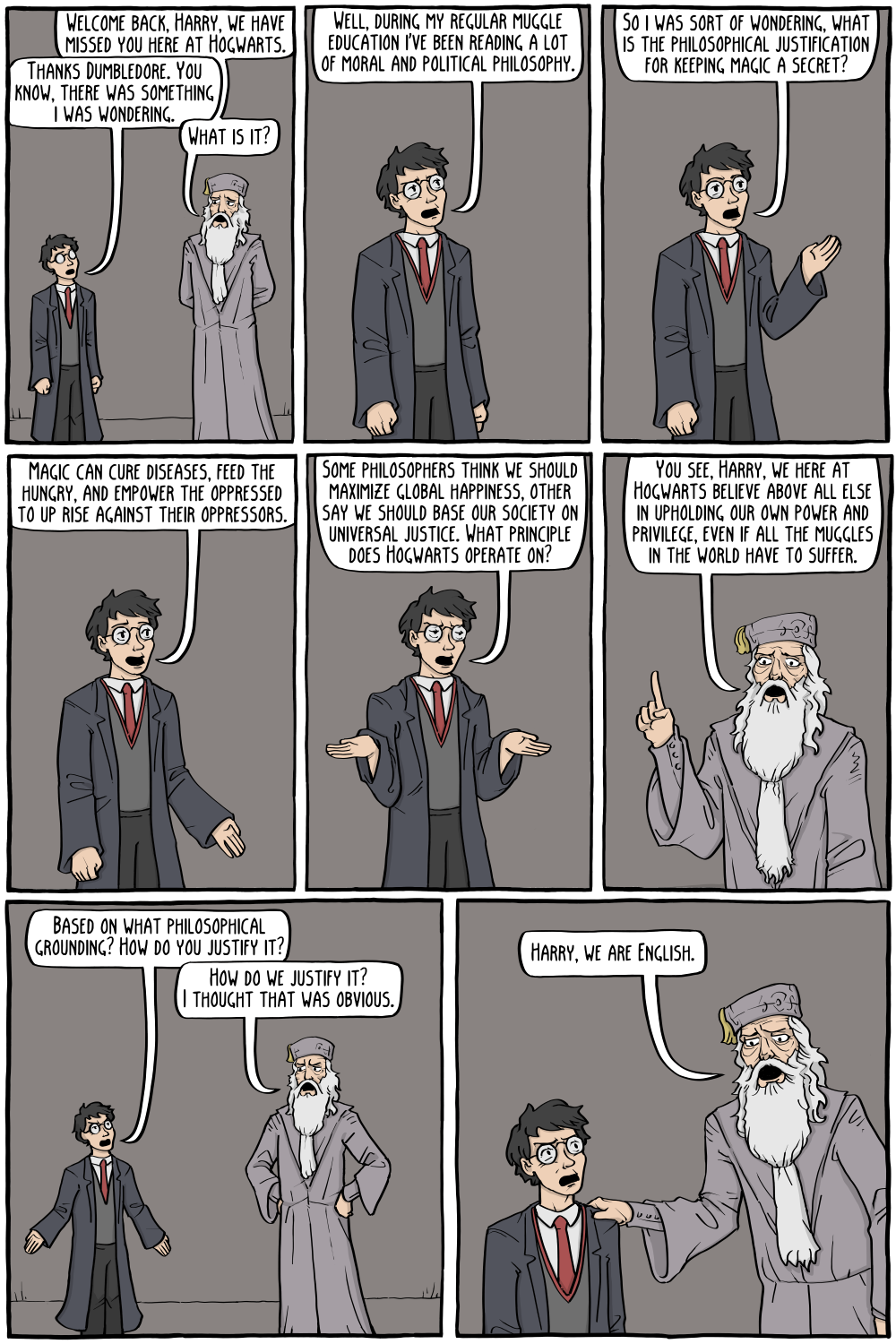
I’m pretty sure the reason they keep to themselves is that the last time magic was public knowledge they were killed en masse during medieval witch hunts, or something. Been a loooooong time since I read the books.
Great and Powerful comic.
I would also add:
- French were doing same
- Bulgarians(?) were doing same
- (in Creatures) Americans were doing same
You would think so, but look at the US and some other countries with racists of different kinds wanting to “go back to the good ol’ days” or wanting to push the societal problems to muggles (or immigrants/POC in the case of the US).
Yep. Based on similar history it probably wasn’t even that the other founders disagreed, they just maybe thought he was taking it a little far.
still exist after the founder basically came out as a racist and want racist rule to be enacted
let me know how the republican party does after novemeber. IF they lose
I think nothing beat the fact Slytherin still exist after the founder basically came out as a racist
That was the most realistic part.
I mean, the whole thing is this big fever-dream written for kids; yanno, a fairy tale. At the same time, our author is someone whose internal moral compass is pretty twisted up. So, logical consistency left the building long before pen was put to paper.
Also, fledgling authors take note: this is what happens when you flagrantly defy thermodynamics over and over again. Nerds will rip your work to shreds.
Not necessarily. This is what happens when you write poorly. Doctor Who’s electric screwdriver is a solve-it-all tool. But it doesn’t ruin the stories in each episode because most are well writen.
Doctor Who has no plot holes?
It’s even simpler than that. The author sets the rules of the world. If those rules change, are ignored, or characters behave in a way that disagrees with the rules the reader’s trust is betrayed.
That’s why people get a stick up their ass about plot holes. They were told things work a certain way, but characters miss an obvious opportunity or break an already established rule. Lack of effort on the author’s part makes the reader feel like their time hasn’t been respected.
I mean, Joanne wrote her first book living in her car by copying other stories. Literally everything interesting or complicated is borrowed from either mythology or some other book. She’s not a great writer, she’s a pretty good writer who wrote kids’ stories that were made into great movies.
To go even further- I think she was too ambitious about her own writing ability.
Having a series of 7 books, each tied to a school year, where the characters age over time, with the intended audience also changing over time. Sorcerer’s Stone is a book about 11 year olds, for 11 year olds. Goblet of Fire is about 14 year olds, for 14 year olds. There’s a lot of wiggle room, but that’s the baseline. Sorcerer’s Stone is a pretty simple children’s book. Prisoner of Askaban starts dealing with the history of Voldemort 's rise to power, starts dealing with more powerful banned spells that raise ethical questions, the criminal justice system, etc.
I remember when book 5 came out being heavily disappointed in it. It was just a dark and depressing slog. Half-Blood Prince was just boring- most of the book focusing too much on just teenage drama and romance. Deathly Hallows had an entirely different tone from the rest of the series and felt like bad fan fiction. All the way up to eh epilogue, where we get a glimpse of the main characters as adults that feels like really hamfosted fan service. I think Rowling was just better at writing for/about 11-14 year olds than she was 15-17 year olds.
I read leaks of Deathly Hallows online in advance and I was convinced they were fake because they seemed to be written so differently than previous books
Nevermind how two wizards dueling under the influence of Felix Felicia would be metal af.
The Intensified Luck Soldiers at the end of Escaflowne had a scene like this and it was one of the best mecha battle flights I’ve ever watched.
Well the person who wrote it thinks “Lolita” is a touching love story so…
Elaborate? I know the plot of Lolita, but never heard that second part.
JKR is a TERF with terrible writing skills and worldbuilding. The idea of a comfy, cozy british castle where you could fulfill your magical dreams and get sorted into a house is an incredibly fun self-insert universe, just like Pokemon, Star Trek, etc.
The idea of a comfy, cozy british castle where you could fulfill your magical dreams and get sorted into a house is an incredibly fun self-insert universe, just like Pokemon, Star Trek, etc.
Which makes her a great children’s book author. Her world building did exactly what it was supposed to do: encourage imagination.
Her political/social views and appeal to adult audiences are irrelevant. I think she’s a fantastic children’s book author because she did the thing that’s most important: get kids to read.
Her political/social views and appeal to adult audiences are irrelevant. I think she’s a fantastic children’s book author because she did the thing that’s most important: get kids to read.
She weaves her awful views into her books, though, from racist caricatures of Jewish People represented by the Goblin Bankers, to the anti-labor organizing section of the books with the odd Hermoine/Elf revolt. It’s entirely relevant.
The world has exciting and fantastical properties, yes, and she did get children to read, absolutely. However, you cannot unti her views from how they were woven into her works.
racist caricatures of Jewish People represented by the Goblin Bankers
Projecting much? She doesn’t make any ties to Jewish people in her portrayal of goblins. I honestly don’t see how anyone could get this impression w/o actively looking for reasons to dislike JK Rowling.
Rowling’s goblins come from European folklore. Here’s a Reddit post about it, or you can feel free to go down a rabbit hole about European folklore and find a bunch of similarly depicted creatures (brownies, leprechauns, etc) and see how Rowling likely constructed her view of these creatures.
I honestly don’t see any overlap between goblins and Jewish people, any overlap is a stretch by critics IMO.
Hermoine/Elf revolt
I don’t see how it’s odd.
Elves were enslaved by exploiting their innate sense of loyalty. Think of something like a dog, who will defend its master even if the master is terrible to it. Or look at humans, where once we’re part of a tribe (however you define that), we’ll overlook issues with that tribe and defend it anyway (see: cults, political divide, racial divide, etc).
Rowling is a feminist (at least how she defines it), but her book uses a male protagonist (perhaps for broader appeal?), so she develops Hermoine into a strong, female character. That’s why she puts this “odd” piece of character development into the story, she wants girls to look up to Hermoine, so she can’t just stay in the background for the whole series. As an outsider, it makes sense for her to attack “insider” things, like acceptance of elvish slavery. She could easily have used another opportunity, but HP had already freed one elf two books prior, so Hermoine trying to free more is just an easy way to develop Hermoine’s character using information already presented (she needs a way to stand apart from HP) and fits with the whole “outsider” thing her character is going for.
I see Harry Potter as having very little social commentary, other than a criticism of government (total ineptness of Ministry of Magic, which I think is a caricature of UK gov’t) and a general theme of combating intolerance (Voldemort is bad because he’s intolerant, not because he’s a murderer). Both of these are great themes for kids, since “adults dumb” and “bullies suck” really resonate with kids.
She uses caricatures as plot devices, not social commentary. Gringotts getting broken into is powerful because it’s guarded by a race that’s uniquely positioned to defend gold. Dobby being freed is powerful because it’s a complete affront to wizarding world norms and an “outsider” solution to a stalemate (elves are intensely loyal, humans are exploitative). Any of her views that make it into the book are more accidental than anything, if not completely fabricated by critics of Rowling.
HP is just a children’s book, not a social commentary.
Regarding the elf slavery, there’s a guest post on Rowling’s blog (which she must at least have approved even though she didn’t write it) that makes the case that Hermione was wrong to attempt to liberate the elves because the elves enjoyed being slaves, and the point of that subplot was to demonstrate that it’s bad when people attempt to solve other people’s problems without a request for help and bad when people get offended on other people’s behalf. A normal person wouldn’t let something advocating for such a major misunderstanding of their work on their blog, especially if it was claiming they were pro-slavery.
Most people reading the books would interpret it as implying Hermione was right, but for someone who’s seen that blog post on Rowling’s site and thinks she read it before it was published and could have vetoed it, it’s not a leap to read it again and conclude that it was meant to be pro-slavery and that’s why the other main characters, who you’re usually supposed to identify with, make fun of Hermione.
On its own, it’s simplest to say it just wasn’t thought through, but when it’s part of a pattern of off-colour opinions, it’s harder to give the benefit of the doubt.
I honestly don’t think making a statement on slavery was the point. I think she wanted Hermoine to assert herself and become a bit more than a supporting character, and the elf thing was low-hanging fruit. So I think we’re supposed to cheer for Hermoine asserting herself, and whether we think she should succeed is kind of irrelevant.
So I think both sides of the argument are reading too much into it.
I am one again asking you to read a different book
It was written for kids who don’t think that deep
By a lady who don’t think that deep
what’s wrong? that bigot terf
What’s wrong with it is that JKR is not smart enough to wing everything and have it make sense. As a result… it doesn’t, much.
It makes enough sense for kids and adults who can suspend disbelief enough to keep turning the pages. And gives all of us reason to listen to some of the many podcasts exploring the plot holes.
Side note, now that I’ve commented a few times in this thread without mentioning it:
JKR is not smart enough to
refrain from using her global platform to attack trans people. Bad Rowling, bad! I’m thankful I can separate artists from art enough to still enjoy something I grew up enjoying but do have a duty to call out her grievously public stance on this so readers know we still fancy ourselves as allies even when stooping to discuss what the now-monster created.
There’s no artistic value to be gained from reading Slaveowner Potter
Ever see boomers writing “cRAP”?
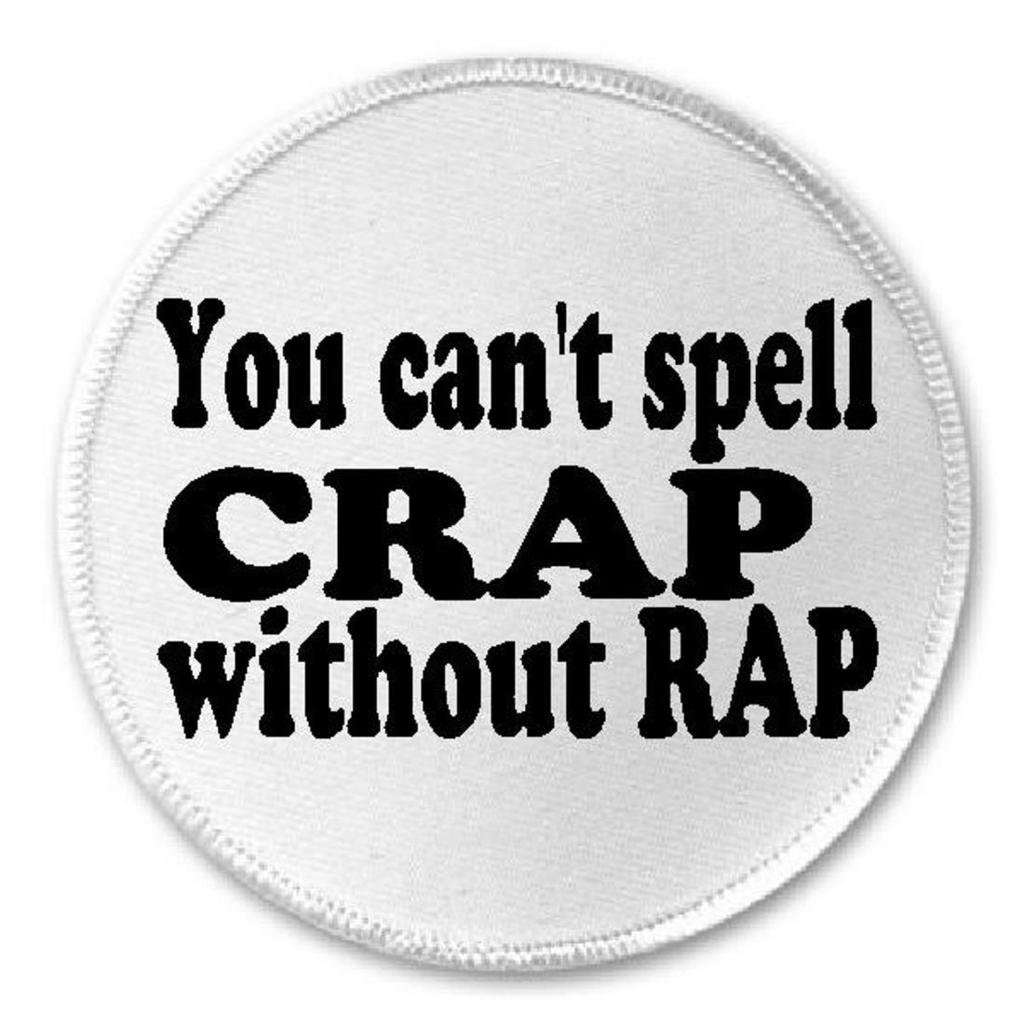
Feels like a literary riff on that, gotta say. The whole thread’s about worldbuilding shortcomings but we’re still here discussing it aren’t we? Clearly it made an impact.
Also - made me think of seeing a Jackson Pollock
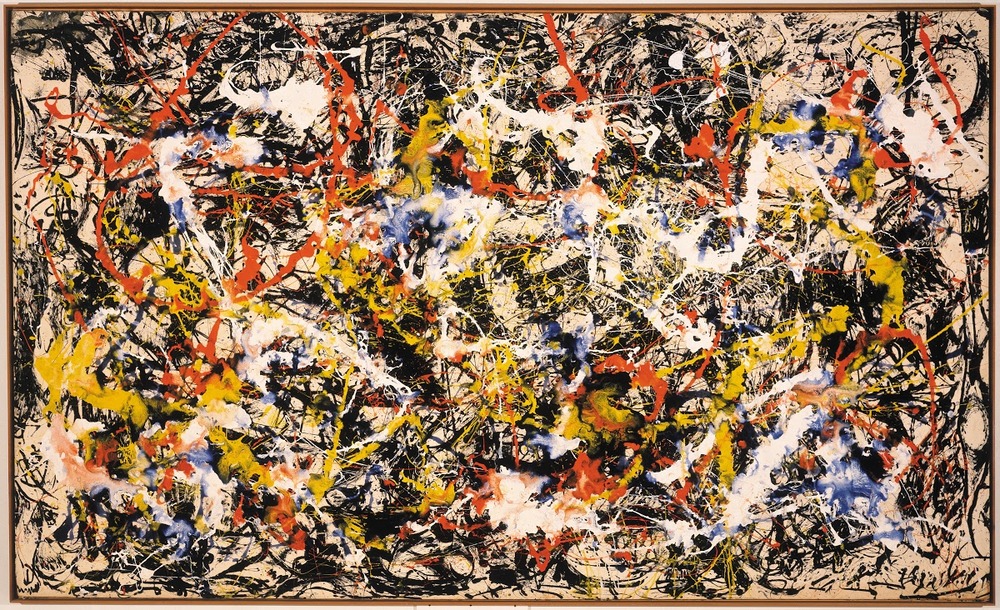
& dismissively muttering “I could do that”
There’s entertainment and thought to be gained, but it’s not of value. It’s neoliberal shit. The books aggressively push a certain set of political beliefs which suck.
define value
A net increase in pleasure, or decrease in suffering, in sentient beings.
that is an effect, not a definition
What about time travel? They had a pocket time travel device and they couldn’t strangle baby Voldemort? Or was there some Avengers endgame multi dimension thing preventing that?
some Avengers endgame multi dimension thing
Some in-universe Harry Potter thing!
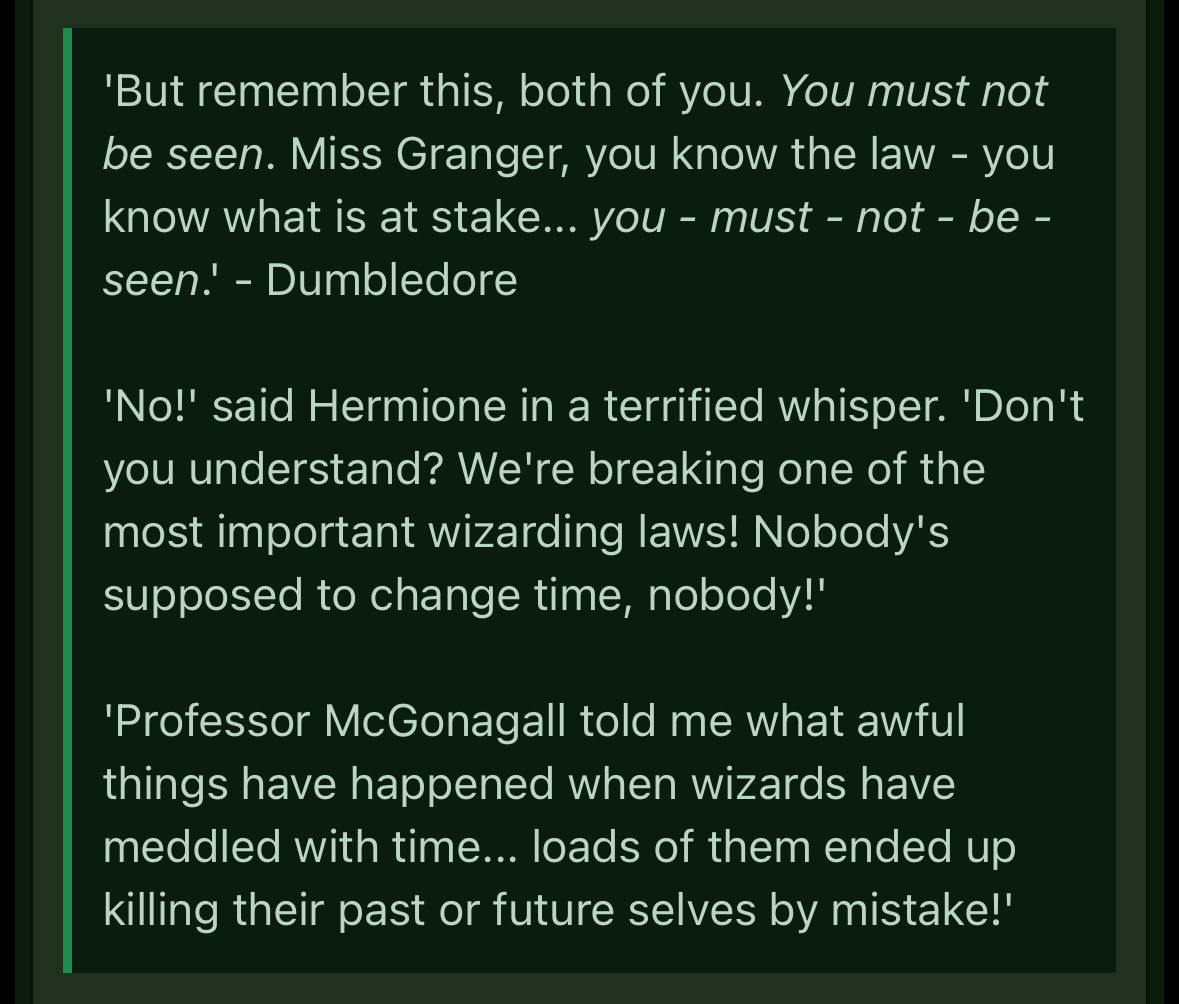
Officially, JK says she went too far with the time turners, so she destroyed all of them:
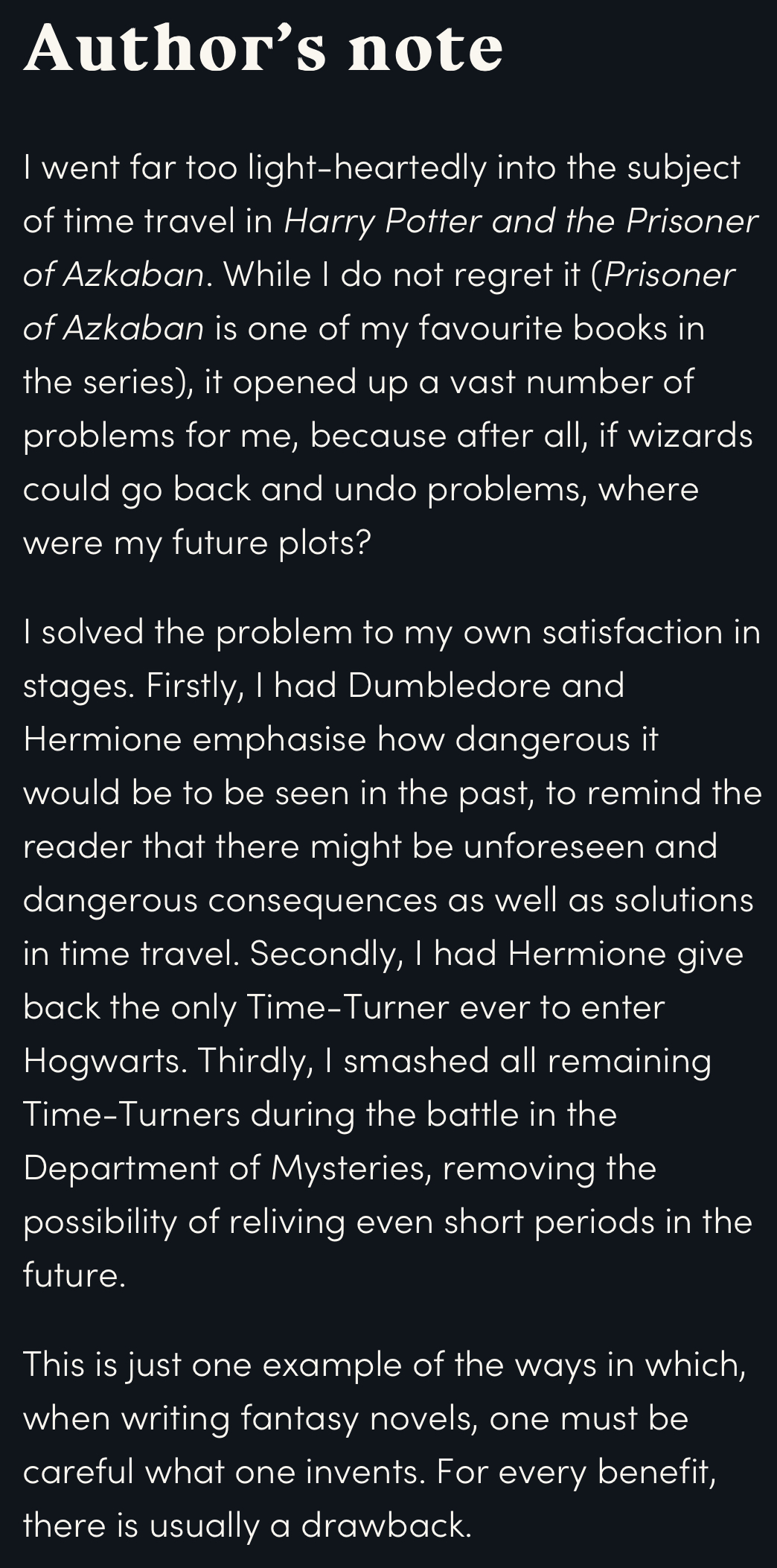
Also in the wizarding world they have a device that makes it incredibly easy to kill a baby. It’s called a knife.
The mother’s love protecting Harry caught Voldemort off guard. It’s not like he got to try using the killing curse on Harry several times. Imagine you want to kill a baby, and you have a gun, and literally no reason to conserve ammo. You wouldn’t pull out your knife in the off chance that the baby is bulletproof.
Technically with the mother’s love protecting him, nothing would’ve worked. Also you are ignoring pride in all of this. Voldemort had a way to kill anyone he hated with barely any effort on his part, using magical abilities. He also hated muggles and all they stood for. Of course he won’t be using a way muggles kill one another if he has magic that is in his mind “better”.
shame none of the other characters were loved by their mothers
I think the explanation is that Lily used old magic that nobody else knew about. Like, it wasn’t just her love, it was a special spell powered by love, in the same way the killing curse is powered by hate. Like, imagine the government is coming to bulldoze your house to build a freeway bypass, and you’re such a big history nerd you pull out some legal precedent from the time of Arthur that says they can’t do it. It was a highly situational spell that nobody bothered to teach to the next generation because you can only use it once, and she just happened to read the most history books on obscure spells.
Alright I’d better insult this series to make up for defending it. Putting Santa hats and beards on the severed slave heads is ghastly.
